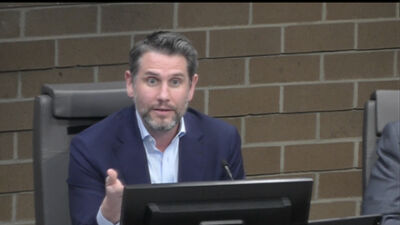STERLING HEIGHTS — If you want to avoid a traffic ticket, keep your cellphone out of your grasp.
Freshly passed state legislation that will penalize drivers for holding or using their cellphones or other electronic mobile devices while driving will be effective June 30.
The adopted bill package, which started in Lansing as House Bills 4250-4252, generally and more broadly prohibits drivers from using a mobile device — such as browsing social media, making calls or recording video — while operating a vehicle. That includes while stopped at a traffic light or stop sign, though not when the vehicle is parked legally.
The legislation also prohibits drivers from holding a mobile device with the hands, arms or shoulders.
The laws do permit using hands-free or voice-operated technology for cellphone calls while behind the wheel. The bill package includes exemptions for certain emergency situations.
In addition, the legislation directs the Michigan State Police to issue a report to Gov. Gretchen Whitmer and Lansing lawmakers about the issue 42 months after implementation.
Whitmer signed the anti-distracted driving bills into law June 7, making them Public Acts 39-41 of 2023. She said in a statement that she was proud to do so.
“Too many Michiganders have lost loved ones to distracted driving, and everyone should be safe on their way to school, home, or work,” she said.
“We developed our last Strategic Highway Safety Plan in 2019 and already we have seen a reduction in the number of fatalities caused by distracted driving. These bills are another step toward reducing that number even further. Our goal is to see zero traffic deaths by 2050 and I know that by working together we can get it done.”
According to the statement from Whitmer’s office, Michigan is now the 26th U.S. state to have hands-free anti-distracted driving legislation. The statement added that Ohio prevented over 500 crashes and saw a 9% decrease in distracted driving over a month’s time after recently enacting a hands-free law.
Local elected representatives and Sterling Heights police also commented on the new laws.
State Rep. Nate Shannon, D-Sterling Heights, chairs the Michigan House of Representatives’ Transportation, Mobility and Infrastructure Committee. He said he was happy that the distracted driving bill package passed out of his committee. He added that the campaign to get the legislation passed had been ongoing for almost four years.
“It’s important legislation; it’s important policy,” he said. “Distracted driving is very dangerous, and people lose their lives over it.”
Shannon said that under previously existing Michigan law, texting and driving was already illegal. But proponents of the new legislation say there was a loophole that didn’t prohibit other smartphone actions such as scrolling through Facebook, watching Netflix or tweeting on Twitter.
Shannon said the new laws will actually save people’s lives. When it comes to risking distracted driving over checking a phone, he simply advised, “Just don’t do it.”
“It’s just not necessary, and you’re putting people’s lives at risk and it’s something that shouldn’t be happening,” Shannon said.
During a June 20 Sterling Heights City Council meeting, state Sen. Stephanie Chang — whose District 3 includes a bit of southwestern Sterling Heights — spoke. She said she wanted to make sure “folks are aware” of the new laws.
“I know it’s a big change,” she said. “So basically, that law says that it is illegal to drive using your cellphone. So previously, it was just illegal to text while driving. Now, it’s anything — social media, taking (a) picture. Whatever it is on your cellphone, don’t do that while you’re driving.”
Sterling Heights Police Chief Dale Dwojakowski said that, starting June 30, his department’s officers will absolutely be on the lookout for people who are driving while holding a cellphone.
“They’ll be pulled over, and they’ll be issued a citation,” he said.
According to the new laws, officers may use the new electronic device restrictions as a “primary or sole reason” for ticketing a motorist. However, under the new laws, improperly using a cellphone is not, by itself, a sufficient reason to give police the right to search a vehicle or its driver or passenger.
Dwojakowski said he welcomed the new laws because they will make phone-related traffic enforcement simpler for officers.
“Texting and driving was difficult because you had to know what they were doing on their phone,” he said. “Now with the hands-free law, just having that phone in your hand is against the law. … It’s going to be much easier for law enforcement to take enforcement action when people decide to use their phone while driving.”
Dwojakowski said he believes that phones often play a role in traffic accidents.
“I would say half of our accidents are someone rear-ending another car,” he said. “And when you rear-end somebody, oftentimes it means you were distracted, and most of the time, I’m willing to bet, it was with a phone.”
The new legislation lists possible penalties for violating the mobile device laws, such as a $100 fine for a first offense and $250 for subsequent violations; community service; and driving record points. Repeat offenders may be ordered to take a driving improvement course.
Learn more about HB 4250-4252 by visiting www.legislature.mi.gov.
 Publication select ▼
Publication select ▼
























